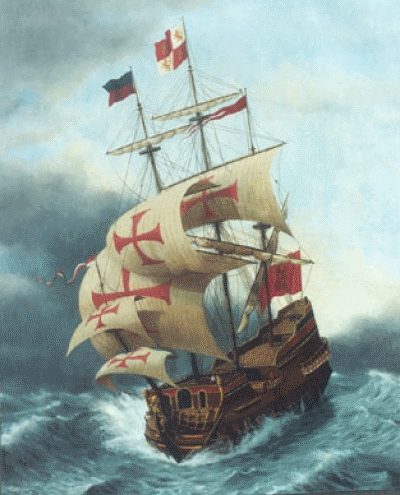The English East India Company was founded in 1599. At first it was an informal group of merchant venturers sponsoring expeditions to the far east, and the Company’s first fleet returned to London in 1603 with great success. Such ventures were fraught with danger, from disease which might wipe out the crew and typhoons which might sink the ship. The Portuguese claimed a monopoly on trade with the far east, so the Company’s fleets were often attacked by Portuguese ships, while Company ships were also in danger from the fleets of their competitors for the trade, the Dutch East India Company. In December 1612 the ships of the Company’s tenth venture trounced a larger Portuguese fleet in the Gulf of Cambay on the west coast of India.
Walter Peyton, a Londoner, was on this tenth voyage, “travelling in the affaires of the honourable Company of the East India adventurers and returning in the year 1612 having carried himself with great discretion and reputation”. Peyton was soon off again, sailing out of Gravesend at the age of 29 in the 260-ton ship “Expedition” under Captain Christopher Newton on January 7th 1613, returning home on July 10th 1614. Walter Peyton kept a journal of this voyage and of the next one, also in the “Expedition”, but now Peyton was the captain, and in charge of a small fleet of other ships. This voyage, beginning in January 1615, lasted until May 1617 and made Peyton rich and famous. (See “Captain Walter Peyton and his Voyages”, by the late Albert Fentiman, available from
Turning his back on the sea, Peyton began a new life as a country gentleman. He came to Sutton Coldfield, where he married Dorothy Stanton in January 1618. She was the daughter of Thomas Stanton of Wolverton Hall near Stratford, and related to several Sutton gentry families. Peyton was well-established enough in Sutton to be recorded as a gentleman in the Heralds’ Visitation of Warwickshire of 1619, where he is described as “of great reputation”. He purchased Marlpit Hall (in Marlpit Lane, Little Sutton) as his country house, and acquired several other Sutton properties.
Peyton’s high reputation secured him a place on the governing body of Sutton, the Warden and Society, where he was elected Warden in 1623. When he made his will in 1639 he styled himself “Esquire”, and had just been awarded a coat of arms by the College of Heralds (a gold cross on a black ground) of which he was very proud. He bequeathed to his son Walter “my ring of gold whereon my coat of arms is engraved in a stone” and requested that his arms should be set on a pillar in Sutton church where he asked to be buried next to his wife’s grave “ in some decent sort at evening.”
